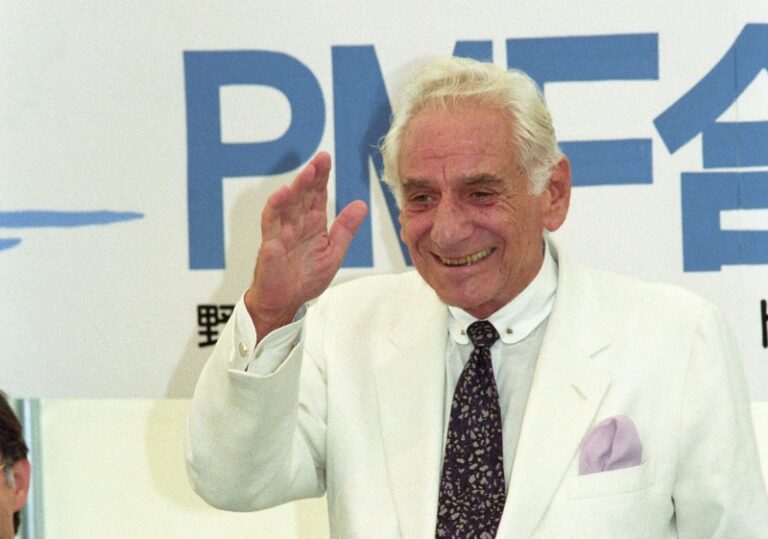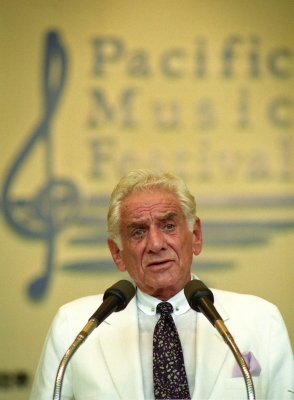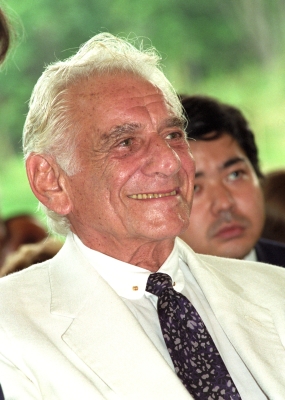The 2nd
LaureateMusic
Leonard Bernstein

Leonard Bernstein was one of the most charismatic American musicians of the past century. His television appearances and educational work have had an enormous influence on a whole generation of musicians. As principal conductor of the New York Philharmonic Orchestra,he was responsible for championing the work of several composers,including the then almost-unknown Mahler. To the general public,he is best known as the composer of West Side Story,1957,and several other hit Broadway musicals. He also composed important concert works,such as the Jeremiah Symphony,1943,and the choral Kaddish Symphony,1963. In all these works the theme of racial identity is to the fore,and Bernstein was a champion of Jewish art and culture. He had a great ability to live and breathe music in public.
Biography
Leonard Bernstein was catapulted into stardom in 1943 when,at the age of 25,he was called upon at short notice to deputise for the indisposed conductor of the New York Philharmonic,Bruno Walter. He captivated the audience with his flair and virtuosity on that occasion,establishing a rapport with his public that never ended. He revelled in the act of performance,and he let it show. Bernstein was above all a communicator,probing and exploring the hidden depths of a piece of music for his audience.
This is especially true in the case of Mahler,whose use of folk music and Jewish music was revealed by Bernstein both in performance and in televised public lectures. It was evident that Bernstein identified strongly with Mahler’s use of vernacular music in the high art context of symphonic composition,as well as with his position as a Jewish composer/conductor in the peculiarly hostile world of turn-of-the-century Vienna. Given that Mahler’s music was almost unknown at the time Bernstein’s campaign began,he may legitimately be claimed to have established this composer’s rightful place in music history. Many of Bernstein’s own compositions are an overt statement of his Jewish identity. Works such as the Jeremiah Symphony,1943,for orchestra with mezzo-soprano solo,and the choral Kaddish Symphony,1963,present a religious side to his nature which is perhaps somewhat at odds with his more familiar reputation as an artist immersed in secular life. Nevertheless,it forms a significant part of his output,culminating in a theatrical setting of the Roman Mass in 1971,which ends with the performers leaving the stage,linking arms amidst the audience and whispering ‘Pass it on. Pass it on.’ Once again,communication is at the heart of Bernstein’s work.
He also wrote a number of popular concert pieces,including the Serenade for Violin and Orchestra,Facsimile,and Fancy Free. His stage works include both the ‘Broadway operetta’ Candide,1956,and the operas Trouble in Tahiti,1952,and A Quiet Place,1983. The style of these works shows a debt not only to the great classics,but also to fellow American composers such as Aaron Copland and William Schuman. The influence of his former teacher at Harvard,Walter Piston,is also present in the orchestration. The essentially melodic impulse of Bernstein’s composition means that these works make few formal or technical innovations,but their direct and honest expression speak well to audiences.
However,it is for his musicals that Leonard Bernstein is best remembered: Wonderful Town,1953,1600 Pennsylvania Avenue,1976,and especially his modern version of the tale of Romeo and Juliet,West Side Story,1957. The significance of this composition should not be underestimated. Its tunefulness and celebrity has made it such a familiar part of the musical landscape that its originality is easily overlooked. It was conceived by the choreographer Jerome Robbins,who commissioned Bernstein and librettist Stephen Sondheim to bring the gritty reality of New York street life to the musical genre. Its theme of young love amidst inter-racial strife and its account of gang warfare achieved a realism which made critics of the day uncomfortable. The music itself showed a startling originality in its synthesis of American musical idioms. Popular song,opera,jazz and classical music are combined to create classic production numbers such as Maria,America,Tonight and Somewhere. West Side Story was also one of the few musicals which successfully transferred to film,receiving ten Academy Awards,including that for Best Picture. The choreography from the original production has even been made into a ballet and all the musical’s elements have been much imitated.
Bernstein’s personality and lifestyle were famously mercurial and it is sometimes difficult to separate the myth from the reality. However,behind the showmanship,he made an enormous contribution to the cultural and educational life of America. He wrote several popular books on music and made over 400 recordings with the New York Philharmonic Orchestra,of which he became director in 1958. He established the Bernstein Education Through the Arts (BETA) Fund,a non-profit organisation dedicated to encouraging the love of learning through a synthesis of art and traditional education. This arose in part from his work at the Boston Symphony Orchestra’s summer institute,Tanglewood,where he had studied conducting under Serge Koussevitsky. Here Bernstein taught and nurtured young musicians over several decades,latterly in a series of televised concerts – a tradition that continues today on the campus named after him. Two months before his death in 1990,Bernstein gave his last performance at Tanglewood,memorably throwing himself with customary vigour into an interpretation of Beethoven’s Seventh Symphony while at the same time gasping for breath. Bernstein had a rare ability to live and breathe music in public,something which attracted devoted followers and led many to musical riches which might otherwise have passed by.
Andrew Hugill
He passed away on October 14,1990,New York
Chronology
Mass: A Theatre piece for Singers,Players and Dancers
Died October 14,New York
-

Pacific Music Festival
-

Pacific Music Festival

